Preload degree of stretch - Study guides, Class notes & Summaries
Looking for the best study guides, study notes and summaries about Preload degree of stretch? On this page you'll find 273 study documents about Preload degree of stretch.
Page 2 out of 273 results
Sort by
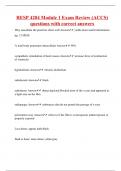
-
RESP 4204 Module 1 Exam Review (ACCS) questions with correct answers|100% verified|24 pages
- Exam (elaborations) • 23 pages • 2024
-
- $13.99
- + learn more
RESP 4204 Module 1 Exam Review (ACCS) questions with correct answers Why auscultate the posterior chest wall Answer yields more useful information pg. 12 HESS % total body potassium intracellular Answer 98% sympathetic stimulation of heart causes Answer increase force of contraction of ventricles hypokalemia Answer chronic alcoholism radiolucent Answer black radiodense Answer object depicted blocked most of the x-rays and appeared as a light area on the film radiopaque Answer...
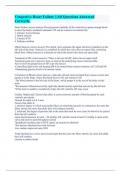
-
Congestive Heart Failure || All Questions Answered Correctly.
- Exam (elaborations) • 8 pages • 2024
-
Available in package deal
-
- $10.49
- + learn more
Heart Failure correct answers The progressive inability of the ventricles to pump enough blood to meet the body's metabolic demands. HF can be caused or accelerated by: 1. Chronic Artery Disease 2. Mitral stenosis 3. Chronic HTN 4. Diabetes mellitus Mitral Stenosis correct answers The mitral valve separates the upper and lower chambers on the left side of the heart. Stenosis is a condition in which the valve does not open fully, restricting blood flow. Mitral stenosis is a disorder in wh...
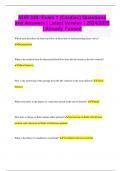
-
NUR 325: Exam 1 (Cardiac) Questions and Answers | Latest Version | 2024/2025 | Already Passed
- Exam (elaborations) • 16 pages • 2024
- Available in package deal
-
- $10.21
- + learn more
NUR 325: Exam 1 (Cardiac) Questions and Answers | Latest Version | 2024/2025 | Already Passed Which term describes the backward flow of blood due to malfunctioning heart valves? Regurgitation What is the medical term for decreased blood flow from the left atrium to the left ventricle? Mitral Stenosis How is the narrowing of the passage from the left ventricle to the aorta defined? Aortic Stenosis What term refers to the degree of ventricular stretch at the end of diastole? Pre...
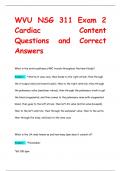
-
WVU NSG 311 Exam 2 Cardiac Content Questions and Correct Answers
- Exam (elaborations) • 39 pages • 2024
- Available in package deal
-
- $12.49
- + learn more
What is the entire pathway a RBC travels throughout the heart/body? Answer- *Starts at vena cava, then heads to the right atrium, then through the tricuspid valve (atrioventricular), then to the right ventricle, then through the pulmonary valve (semilunar valves), then through the pulmonary trunk to get the blood oxygenated, and then comes to the pulmonary veins with oxygenated blood, then goes to the left atrium, then left AV valve (mitral valve;bicuspid), then to the left ventricle,...
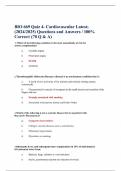
-
BIO 669 Quiz 4- Cardiovascular Latest;(2024/2025) Questions and Answers / 100% Correct/ (78 Q & A)
- Exam (elaborations) • 19 pages • 2024
- Available in package deal
-
- $14.99
- + learn more
BIO 669 Quiz 4- Cardiovascular Latest;(2024/2025) Questions and Answers / 100% Correct/ (78 Q & A) BIO 669 Quiz 4- Cardiovascular Latest;(2024/2025) Questions and Answers / 100% Correct/ (78 Q & A) 1. Which of the following conditions is the most immediately at risk for serious complications? a. Unstable angina b. Prinzmetal angina c. STEMI d. NSTEMI 2. Thromboangiitis obliterans (Buergers disease) is an autoimmune condition that is: a. A result of over activation of ...
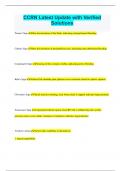
-
CCRN Latest Update with Verified Solutions
- Exam (elaborations) • 37 pages • 2023
- Available in package deal
-
- $10.99
- + learn more
CCRN Latest Update with Verified Solutions Turner's Sign blue discoloration of the flank, indicating retroperitoneal bleeding Cullen's Sign blue discoloration of periumbilical area, indicating intra-abdominal bleeding Coopernail's Sign bruising of the scrotum or labia, indicating pelvic bleeding Kehr's Sign deferred left shoulder pain (phrenic nerve irritation related to splenic rupture) Chvostek's Sign facial muscle twitching, seen when cheek is tapped; indicates hypocalcemia Troussea...
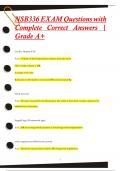
-
NSB336 EXAM Questions with Complete Correct Answers | Grade A+
- Exam (elaborations) • 22 pages • 2024
- Available in package deal
-
- $11.49
- + learn more
Cardiac Output (CO) Ans: Volume of blood ejected per minute from the heart CO= stroke volume x HR Average 4-8L/min Reduction in CO leads to increased HR and decreased Bp blood pressure Ans: Pressure exerted by the blood upon the walls of the blood vessels, expressed in millimeters of mercury. Seagull sign (Portsmouth sign) Ans: HR exceeding blood pressure. Critical sign of decompensation renin-angiotensin-aldosterone system Ans: Hormone system that controls BP (long term regulation) ...
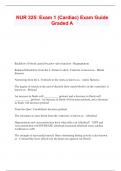
-
NUR 325: Exam 1 (Cardiac) Exam Guide Graded A
- Exam (elaborations) • 8 pages • 2024
-
- $11.99
- + learn more
Backflow of blood caused by poor valve function - Regurgitation Reduced blood flow from the L Atrium to the L Ventricle is known as - Mitral Stenosis Narrowing from the L Ventricle to the Aorta is known as - Aortic Stenosis The degree of stretch at the end of diastole (how much blood is in the ventricles) is known as - Preload An increase in fluids will __________ preload, and a decrease in fluids will ___________ preload - An increase in fluids will increase preload, and a decrease ...
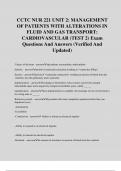
-
CCTC NUR 221 UNIT 2: MANAGEMENT OF PATIENTS WITH ALTERATIONS IN FLUID AND GAS TRANSPORT: CARDIOVASCULAR (TEST 2) Exam Questions And Answers (Verified And Updated)
- Exam (elaborations) • 30 pages • 2024
-
- $12.49
- + learn more
CCTC NUR 221 UNIT 2: MANAGEMENT OF PATIENTS WITH ALTERATIONS IN FLUID AND GAS TRANSPORT: CARDIOVASCULAR (TEST 2) Exam Questions And Answers (Verified And Updated) 3 layers of the heart - answerepicardium, myocardium, endocardium diastole: - answerperiod of ventricular relaxation resulting in *ventricular filling* Systole: - answerperiod of *ventricular contraction* resulting in ejection of blood from the ventricles into the pulmonary artery and aorta depolarization- - answerExchange of...
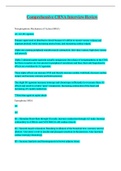
-
Comprehensive CRNA Interview Review Accurate responses are given.
- Presentation • 70 pages • 2023
-
- $18.99
- 3x sold
- + learn more
Comprehensive CRNA Interview Review Accurate responses are given. Comprehensive CRNA Interview Review Norepinephrine Mechanism of Action (MOA) A1, A2, B1 agonist. Primary agent used in distributive shock because it's ability to recruit venous volume and augment preload, while increasing arterial tone, and increasing cardiac output. Alpha one causing peripheral smooth muscle contraction. (low dose venous, high dose venous and arterial). Alpha 2 adrenoreceptor agonism actually ant...

That summary you just bought made someone very happy. Also get paid weekly? Sell your study resources on Stuvia! Discover all about earning on Stuvia


